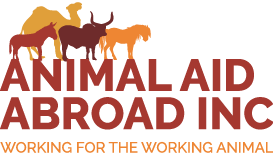MARES Zimbabwe July 2023 Report
The Matabeleland Animal Rescue & Equine Sanctuary (MARES) in Zimbabwe are working incredibly hard to improve the lives of working equines in their area and it is donations from our donors, like you, that keep this group in operation. Following is their report for July 2023:
Due to the total collapse of the main road from Bulawayo to Dete, Mabale and Jembwe, MARES relied on their colleagues in these areas to continue the education and outreach. In Dete the 3 donkeys have recovered extremely well and it is confirmed that the donkey attacked from the rear is pregnant. Due to the extent of the injuries, our colleagues will keep the donkey until she has had her foal to ensure there are no complications before returning them back to the owner. MARES has been sending all the necessary medicines, bandages, vaccines and feed for the 3 donkeys in their care.
Progress on the moringa plantation has been halted due to the extreme cold and frost Mabale has ever encountered and sadly, we lost most of the saplings to the frost. The company who supplied us with the saplings has very kindly offered to replace them. We shall wait until the weather warms up before embarking on the project and hopefully get them all in before the rains. The solar panels and borehole pump has been installed and the main water trough for all domestic livestock as well as the donkeys has been repaired and is up and running. A very big thank you to Soft-foot Alliance for undertaking this huge task whilst we were unable to get to Mabale. Soft Foot Alliance will also be assisting MARES to erect the donkey sanctuary stalls and fencing.
The extreme cold Zimbabwe faced in July, took its toll on the donkeys and it was with great sadness that two of our resident donkeys passed away. The post mortems both showed a form of gas colic. Research has shown that donkeys cannot control their temperatures in sudden extreme changes and causes colic. Donkeys are also very reluctant to drink water when the temperatures are so low, causing impactions.
We also had 2 cases of severe gastrodiscus in 2 donkeys. The one extremely thin donkey which we had been treating for the normal types of worms showed a count of 1000! The highest ever recorded by the pathologists. Dr. Van Laren, a veterinarian specialising in parasites published a paper on this severe case.
MARES was called out to collect a donkey in a small town called Chegutu, some 370kms from Bulawayo, a 740km round trip! The donkey had suffered under the hands of humans resulting in STD, severe wounds over the back from a hard, heavy object and lacerations in the inguinal area, vulva and anus, not to mention recently being blinded. The attending veterinarian suggested euthanasia but we felt she should be given a chance. We named her Melody. Although we have been unable to restore her eyesight, she is recovering very well and it has been confirmed through an ultrasound that she is pregnant. Melody will remain at MARES Sanctuary.












